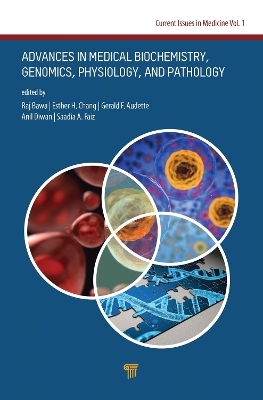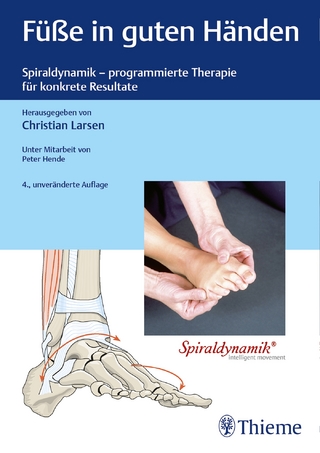
Advances in Medical Biochemistry, Genomics, Physiology, and Pathology
Jenny Stanford Publishing (Verlag)
978-981-4877-44-2 (ISBN)
The pace and sophistication of advances in medicine in the past two decades have necessitated a growing need for a comprehensive reference that highlights current issues in medicine. Each volume in the Current Issues in Medicine series is a stand‐alone text that provides a broad survey of various critical topics—all accomplished in a user-friendly yet interconnected format. The series not only highlights current advances but also explores related topics such as translational medicine, regulatory science, neglected diseases, global pandemics, patent law, immunotoxicology, theranostics, big data, artificial intelligence, novel imaging tools, combination drug products, and novel therapies. While bridging the gap between basic research and clinical medicine, this series provides a thorough understanding of medicine’s potential to address health problems from both the patient’s and the provider’s perspectives in a healthcare setting. The range of topics covered and the expertise of the contributing authors accurately reflect the rapidly evolving areas within medicine—from basic medical sciences to clinical specialties. Each volume is essential reading for physicians, medical students, nurses, fellows, residents, undergraduate and graduate students, educators, policymakers, and biomedical researchers. The multidisciplinary approach of the series makes it a valuable reference resource for the pharmaceutical industry, academia, and governments. However, unlike other series on medicine or medical textbooks, this series focuses on current trends, perspectives, and issues in medicine that are central to healthcare delivery in the 21st century. Volume 1 focuses on the current issues in basic medical sciences, subjects that are fundamental to the practice of medicine. Specifically, it covers medical biochemistry, genomics, physiology, and pathology. These subjects, traditionally taught in the first two years of medical school that precede clinical instruction, provide a core of basic knowledge critical to the success in clinical medicine during rotations, training, and medical practice.
Raj Bawa, MS, PhD, MD, is president of Bawa Biotech LLC (founded in 2002), a biotech/pharma consultancy and patent law firm based in Ashburn, Virginia, USA. Trained as a microbiologist and biochemist, he is an inventor, author, entrepreneur, professor, and registered patent agent (since 2002) licensed to practice before the US Patent & Trademark Office. He is currently a scientific advisor to Teva Pharmaceutical Industries (Israel), a visiting research scholar at the Pharmaceutical Research Institute of Albany College of Pharmacy (Albany, NY), and vice president/chief IP officer at Guanine, Inc. (Rensselaer, NY). He has served as a principal investigator of various research grants, most recently as a principal investigator of a CDC grant to develop an assay for carbapenemase resistant bacteria. He was an adjunct professor at Rensselaer Polytechnic Institute (Troy, NY) from 1998 to 2018. After earning a BSc (Honors School) in microbiology, he earned a MS (cancer biology), a PhD (biophysics/biochemistry) and an MD. In the 1990s, Dr. Bawa held various positions at the US Patent & Trademark Office, including primary examiner from 1996–2002. Presently, he is a life member of Sigma Xi, cochair of the nanotech and precision medicine committees of the American Bar Association and founding director of the American Society for Nanomedicine (established in 2008). He has authored over 100 publications, edited 8 texts, and serves on the editorial boards of numerous peer-reviewed journals, including serving as an associate editor of Nanomedicine (Elsevier). Esther H. Chang, PhD, is a member of the Departments of Oncology and Otolaryngology at the Lombardi Comprehensive Cancer Center of Georgetown University Medical Center, USA. She previously held positions at the National Cancer Institute, Stanford University, and the Uniformed Services University of Health Sciences. She is president of the American Society for Nanomedicine and an executive board member of the International Society for Nanomedicine. Dr. Chang is the founding scientist of and senior consultant for SynerGene Therapeutics, Inc., a privately held company that has five ongoing clinical trials for two distinct nanomedicines. She has over 140 scientific publications and has served as a member of a number of scientific advisory boards for NCI, NASA, the US Military Cancer Institute, and the Department of Energy. Dr. Chang’s research effort focuses primarily on the molecular mechanisms of carcinogenesis and in translating this basic information into new clinical modalities. She has been a contributor in the understanding of oncogenes and tumor suppressor genes. She has also contributed to the understanding of the molecular basis of resistance to radiation and chemotherapy. She is the inventor/co-inventor of 115 issued patents (50 applications being prosecuted) surrounding a tumor-targeting nanodelivery platform being developed by SynerGene. This nanodelivery system represents a broad platform nanotechnology in that the payload for delivery can include gene therapy, siRNAs/miRNAs, antisense oligonucleotides, imaging agents, and chemotherapeutic agents. Gerald F. Audette, PhD, is associate dean of faculty in the Faculty of Science, an associate professor of chemistry, and member of the Centre for Research on Biomolecular Interactions at York University, Canada. His research focuses on the correlation between protein structure and biological activity of proteins involved in bacterial conjugation, in particular, the type 4 secretion system from the conjugative F-plasmid of Escherichia coli. In addition, his research targets the type IV pilins and associated assembly systems from several bacterial pathogens and is exploring the adaptation of these protein systems for applications in bionanotechnology and nanomedicine. Dr. Audette is the co-editor of volumes 1–4 of the Jenny Stanford Series on Nanomedicine and is a subject editor of structural chemistry and crystallography for the journal FACETS. Anil R. Diwan, PhD, is president and chairman of NanoViricides, Inc., a publicly traded company dedicated to advancing antiviral applications of a novel nanomedicines platform with the potential for creating drugs that the virus cannot escape by virtue of genomic changes, (mutations, recombinations, re-assortments) that are common in the virus world. He founded his own private company and began working in nanomedicines circa 1992. There he invented ""TheraCour®"" polymeric micelle zip-code-like targeting and encapsulating drug delivery platform. With his colleagues at AllExcel, Inc., he has also co-developed a novel cell therapy that promises to be a cure for Parkinson’s Disease. Dr. Diwan received his first US patent in nanomedicines in 2004. Further advancements have already resulted in three international PCT applications that have matured into a number of patents worldwide. Dr. Diwan co-founded NanoViricides, Inc., in 2005 and played a key role in its up-listing NYSE-American exchange in 2013. He has been instrumental in raising over $100 million at NanoViricides since founding it. He was also instrumental in the design and architecture of the new NanoViricides campus in Shelton, CT with discovery-to-cGMP-manufacture capabilities under one roof. Dr. Diwan was recognized as ""2014 Researcher of the Year"" by BusinessNewHaven and NewHaven Register group, which provides annual recognitions for outstanding individuals in Connecticut state. Dr. Diwan obtained his BS in chemical engineering from the Indian Institute of Technology, Bombay, India, in 1980. Acceptance to the Indian Institute of Technology is based on the ultra-competitive Joint Entrance Examination. Dr. Diwan stood 9th nationally in this examination. Following his undergraduate degree, he obtained his PhD in (bio)chemical engineering in 1986 from Rice University, Houston, USA. Saadia A. Faiz, MD, currently practices at the University of Texas MD Anderson Cancer Center as a pulmonary and sleep specialist in cancer medicine. She is a professor of pulmonary medicine in the Division of Internal Medicine. She is board certified by the American Board of Internal Medicine in internal medicine, critical care, pulmonary and sleep medicine. Dr. Faiz is an active member of the American College of Chest Physicians and serves on the 2020 Scientific Program Executive Committee, the Clinical Pulmonary Network Steering Committee, and Educator Development Subcommittee. Her research interests include pulmonary manifestation of cancer, pleural disease in hematologic malignancies, pulmonary hypertension in cancer and sleep and cancer. She also dedicated a significant amount of time to trainee education specifically using simulation for procedural education. She founded and is the director for the Southwest Regional Boot Camp for First Year Pulmonary and Critical Care Fellows, and she serves as an associate program director for the McGovern Medical School at UTHealth PCCM fellowship. She also serves as a faculty instructor for the CHEST Live Learning Pleural Procedures course and at the annual CHEST Fellows course.
1. The Age of COVID-19: Medical Facts and Fiction Section 1: Medical Biochemistry and Genomics 2. Role of Engineered Proteins as Therapeutic Formulations 3. How Physical and Chemical Information Predicts the Action of Molecules: A Historical Overview 4. Three-Dimensional Chromatin in Infectious Disease: A Role for Gene Regulation and Pathogenicity? 5. Aptamers, the Nucleic Acid Antibodies, in Cancer Therapy 6. Identifying Genetic Markers Associated with Susceptibility to Cardiovascular Diseases 7. Production and Application of Multicistronic Constructs for Various Human Disease Therapies 8. The Nuclear Lamina: Protein Accumulation and Disease 9. The Importance of Protein Post-Translational Modifications in the Pathogenesis and Progression of Neurodegenerative Diseases 10. DNA Damage/Repair Management in Cancers 11. Advancing Clinical Cohort Selection with Genomics Analysis on a Distributed Platform 12. Pharmacogenomics of Tamoxifen 13. Nanocrystals: The Universal Formulation Principle to Improve the Bioactivity of Poorly Soluble Actives 14. Cellular Mechanisms of Human Atherogenesis: Focus on Chronification of Inflammation and Mitochondrial Mutations 15. Vitamin D Pathway and the Pathogenesis of Inflammatory Bowel Disease 16. The Structural Ensemble of the Conjugative F-like T4SS 17. Polygenic Risk-Tailored Screening for Prostate Cancer: A Benefit–Harm and Cost-Effectiveness Modelling Study 18. Apoptotic Bodies: Particular Extracellular Vesicles Involved in
Intercellular Communication Section 2: Human Physiology and Pathology 19. Circulating Tumor Cells and Personalized Medicine 20. Pathology in the Era of Personalized Medicine 21. Speech Intelligibility during Clinical and Low Frequency 22. Physiological Renormalization Using Systems Therapeutics 23. Pathology Is Always Around Us: Apophenia in Pathology, a Remarkable Unreported Phenomenon 24. The Secrets of the Mediterranean Diet. Does [Only] Olive Oil Matter? 25. Relationship between Diet, Microbiota, and Healthy Aging 26. Does Low-Density Lipoprotein Cholesterol Induce Inflammation? If So, Does It Matter? Current Insights and Future Perspectives for Novel Therapies 27. Role of Biomarkers in Clinical Development of Cancer Therapies 28. In Sickness and Health: Effects of Gut Microbial Metabolites on Human Physiology 29. Current Methodologies Utilized in the Conduct of Randomized Clinical Trials 30. The Prion-Like Phenomenon in Alzheimer’s Disease: Evidence of Pathology Transmission in Humans
| Erscheinungsdatum | 29.12.2021 |
|---|---|
| Zusatzinfo | 30 Tables, black and white; 13 Illustrations, color; 124 Illustrations, black and white |
| Sprache | englisch |
| Maße | 178 x 254 mm |
| Gewicht | 1620 g |
| Themenwelt | Medizin / Pharmazie ► Allgemeines / Lexika |
| Medizin / Pharmazie ► Physiotherapie / Ergotherapie ► Orthopädie | |
| Medizin / Pharmazie ► Studium | |
| Naturwissenschaften ► Biologie | |
| Technik ► Medizintechnik | |
| Technik ► Umwelttechnik / Biotechnologie | |
| ISBN-10 | 981-4877-44-1 / 9814877441 |
| ISBN-13 | 978-981-4877-44-2 / 9789814877442 |
| Zustand | Neuware |
| Informationen gemäß Produktsicherheitsverordnung (GPSR) | |
| Haben Sie eine Frage zum Produkt? |
aus dem Bereich


